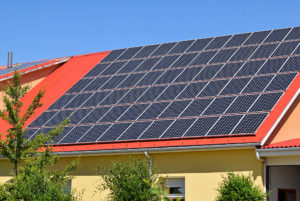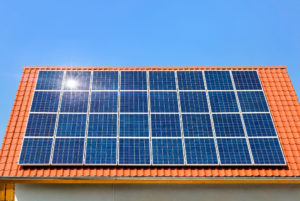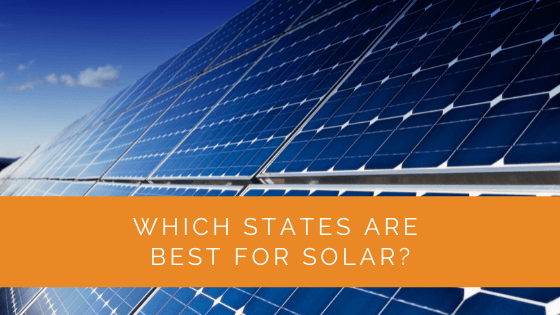Solar power is a leading source of renewable energy in an era of eco-friendly choices. In this guide, we explore the best states for solar energy, providing information on incentives, costs, and performance to help you make informed decisions. Discover which states shine brightest in the world of solar power.
Contents
- 1 Key Takeaways
- 2 Why opt for Renewable Energy?
- 3 How much do Solar Panels Cost?
- 4 Why is Solar Power the Best Option in your State?
- 5 How is the Solar Energy Industries Association Helpful?
- 6 What is the Future of Solar in America?
- 7 FAQS
- 8 Case Study: Maximizing Solar Potential
- 9 Expert Insights From Our Solar Panel Installers About Which States Are Best for Solar
- 10 Experience Solar Excellence with Us!
- 11 Final Words
Key Takeaways
- Solar energy adoption in the United States has led to a 167% increase in solar jobs over the past decade, making it essential for homeowners to consider renewable energy sources.
- The cost of solar panels varies but can help reduce electricity costs, and certain states offer financial incentives and tax exemptions for residential solar systems.
- Some of the top states for solar energy installations include California, South Carolina, Massachusetts, Arizona, and Texas, each with unique advantages and incentives for solar power adoption.
Why opt for Renewable Energy?
Whether it’s Rhode Island or the Golden State of California, solar installations are a good investment in your home. As a form of renewable energy, the solar market generates energy that produces no harmful greenhouse gas emissions.
There are more incentives, including reduced dependence on imported fuels and economic developments in top solar states. Sunny days will be ahead if you switch from fossil fuels to residential solar energy systems.
How much do Solar Panels Cost?
On a national average, solar power installations cost about $16,000 or between $3,500 to $35,000, depending upon the solar capacity and solar generation. However, solar panels can also help you save electricity costs, and you shall have a home powered by the sun.
If you need to plan a budget, here are the best states for a solar energy system so that you can make your rooftop solar-friendly:
- Alaska – $13,500
- Arizona – $13,700
- Arkansas – $14,800
- California – $15,300
Having small-scale solar systems in the form of residential solar panels is a good idea for financial incentives and tax exemptions.
Why is Solar Power the Best Option in your State?
Solar companies constantly state that homeowners should glorify the top states for solar power and turn every place into sunshine. However, every state can turn into large-scale solar farms if they want to.
Here is a state rank in no particular order to show you why your home is a part of the best solar states.
California
The state of California is the perfect place for solar panel installations and solar rebates. Naturally, the sun shines with full power, making it one of the best states for solar installations. The amount of sunlight is great for the solar industry and has excellent net metering.
However, having your home powered by solar means that electricity will vary depending on the time of day. Something to keep in mind about this renewable energy.

South Carolina
In South Carolina, the state legislature allows you a lot of other incentives, unlike California. There are statewide policies that mean solar customers receive 25 percent tax incentives that can be combined with a 30 percent tax incentive for solar energy.
This means you have tax exemptions and great performance payments in this garden state for solar power.
Massachusetts
In Massachusetts, your electricity powered by solar energy means you can reduce your MA state taxes after installing a solar power system. PV systems are exempt from sales and property tax in the Bay State!
Arizona
Arizona is one of the sunniest states in America. Hence, a solar system in your house in this state will produce much energy annually. Various factors determine how much solar electricity you can produce in Arizona.
Texas
There are tremendous opportunities offered to Texas by solar power. It provides a high-value electric supply. There is affordability, zero fuel costs, significant regional economic development, very low water use, and much more!
Even Texans universally support solar energy, so this is an excellent place to be.
These were a few places, but don’t worry, these aren’t the only states for solar!
How is the Solar Energy Industries Association Helpful?
The Solar Energy Industry Association is an American trade association that helps you understand solar incentives. It also works to expand markets and strengthen and develop research to find a way to store the highest solar capacity and more.
The Solar Energy Research and Advancement Act 2007 was passed in the last decade. SEA also supports this. It’s been more than eight years since this Act, and it has helped in making significant strides towards clean and renewable power.
What is the Future of Solar in America?
Solar energy plays a significant role in renewable energy consumption in the United States, contributing to nearly 11 percent of the total. Solar energy encompasses various applications, including rooftop panels and solar thermal power plants, which harness sunlight to generate electricity. Additionally, residential and commercial buildings increasingly use solar heating systems for water heating and space heating.
A noteworthy study recently explored the potential for solar power to provide substantial energy to the United States. This study, jointly conducted by the US Department of Energy Solar Technologies Office and the National Renewable Energy Laboratory, examined the feasibility of powering up to 40 percent of the nation through solar energy by implementing cost-effective measures and supportive policies.

FAQS
Do Solar Panels Affect Your Property Tax?
You may be wondering, are there property tax exemptions to solar systems? Some states and municipalities have solar energy property tax exemptions. This means installing a solar energy device.
Are Solar Systems a Good Investment in your State?
If the electricity that powers your home is from solar energy, you have made a very good investment in your future. A PV system is great for every state in America. However, the best states include California, North Carolina, and Arizona.
How Much of Florida Is Powered by Solar Energy?
Florida is killing it in the solar game. Over the last decade, renewable energy powered about 5 percent of Florida’s in-state electricity generation. Two-thirds of that energy came from the sun.
Do Solar Systems Work Without a Sunny Day?
PV panels can use the sun directly or indirectly to generate electricity. However, they are the most effective when the sun is shining brightly. These panels will work even when the light is not entirely falling on them.
Rain and clouds won’t hurt your panels, but on the other hand, they will help them by washing away the dust or dirt.
Case Study: Maximizing Solar Potential
Background
At Solar Panels Network USA, we are committed to providing tailored solar solutions that maximize energy efficiency and financial savings for our clients. Recently, we worked with a homeowner in South Carolina to leverage the state’s favorable solar incentives and sunny climate.
Project Overview
The client, a homeowner with a strong interest in sustainable living, wanted to reduce their reliance on grid electricity and take advantage of South Carolina’s solar tax incentives. Their primary goals were to lower energy costs, increase energy independence, and contribute to environmental sustainability.
Implementation
We began by conducting an energy audit to assess the client’s energy consumption patterns and determine the optimal size for the solar panel system. Based on the findings, we recommended a 7kW solar power system, which would adequately cover their energy needs while maximizing the benefits of the available incentives.
Key components of the project included:
- Solar Panel Installation: We installed 20 high-efficiency monocrystalline solar panels on the client’s rooftop. These panels were selected for their superior performance and durability.
- Inverter System: An inverter was installed to convert the DC power generated by the panels into AC power suitable for household use.
- Net Metering Setup: We facilitated the setup of a net metering system, allowing the client to earn credits for excess electricity generated and fed back into the grid.
Results
The project yielded excellent results, both in terms of energy production and financial savings:
- Energy Savings: The solar panel system produced sufficient electricity to meet nearly all of the homeowner’s energy needs, significantly reducing their monthly electricity bills.
- Tax Incentives: By taking advantage of South Carolina’s 25% state tax credit and the 30% federal tax credit, the client was able to substantially lower the initial cost of the solar installation.
- Environmental Impact: The switch to solar energy reduced the household’s carbon footprint, contributing to a cleaner environment and supporting the homeowner’s commitment to sustainability.
The client expressed high satisfaction with the project, particularly appreciating the financial benefits and the seamless integration of the solar system with their home.
Summary
This case study highlights the substantial benefits of installing solar panels in South Carolina, where generous state and federal incentives, combined with ample sunlight, create an ideal environment for solar energy adoption. By providing customized solutions that maximize these advantages, Solar Panels Network USA helps homeowners achieve energy independence and long-term savings while contributing to environmental sustainability.
Expert Insights From Our Solar Panel Installers About Which States Are Best for Solar
California offers exceptional incentives and a sunny climate that maximizes solar energy production. The state’s robust net metering policies further enhance the financial benefits of going solar.
Senior Solar Technician
South Carolina’s combination of state and federal tax credits makes it one of the most cost-effective states for solar installations. Homeowners can significantly reduce their upfront costs and enjoy long-term savings.
Lead Solar Installer
Texas has vast potential for solar energy due to its ample sunlight and supportive policies. The state’s growing solar market provides great opportunities for both residential and commercial installations.
Chief Solar Engineer
Experience Solar Excellence with Us!
Trust in Solar Panels Network USA, where our seasoned experts deliver top-quality solar solutions for homes and businesses nationwide. With a legacy of countless successful installations and a commitment to sustainable energy, we’re your reliable partner in the solar journey. Ready for a brighter, eco-friendly future? Call us now at (855) 427-0058 and harness the sun’s power!
Final Words
In the United States, it was recently released that solar power has become more affordable and accessible than ever before. This is great as there is enough power to give electricity to 18 million American homes. Over 3 percent of US electricity in this age comes from solar energy in solar photovoltaics and concentrating solar-thermal power.
This renewable and clean form of energy is unlike fossil fuels, such as coal and natural gas. Solar power does not release harmful greenhouse gases or pollutants and emissions like carbon dioxide. Your air and water supply remains clean.
Overall, investing in a solar system saves the environment and your own pocket.
About the Author
Solar Panels Network USA stands at the forefront of solar energy solutions, driven by a team of seasoned solar engineers and energy consultants. With over decades of experience in delivering high-quality solar installations and maintenance, we are committed to promoting sustainable energy through customer-centric, tailored solutions. Our articles reflect this commitment, crafted collaboratively by experts to provide accurate, up-to-date insights into solar technology, ensuring our readers are well-informed and empowered in their solar energy decisions.

